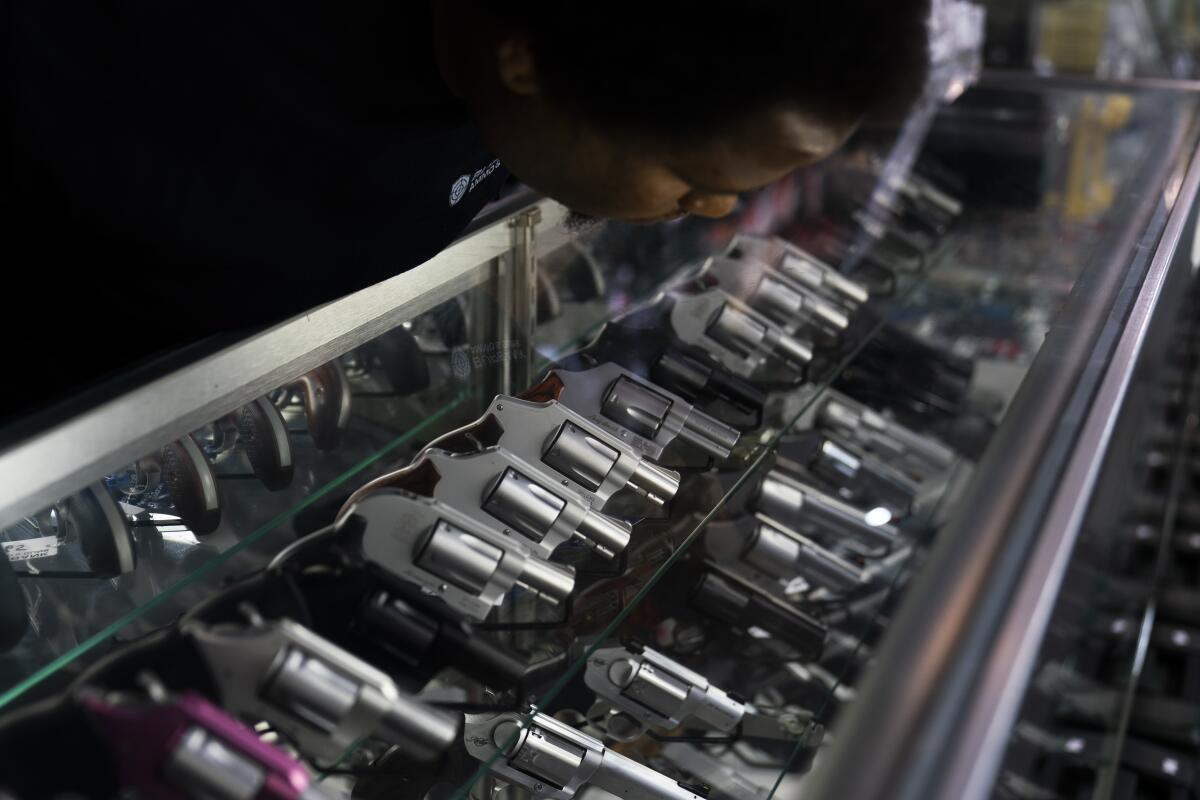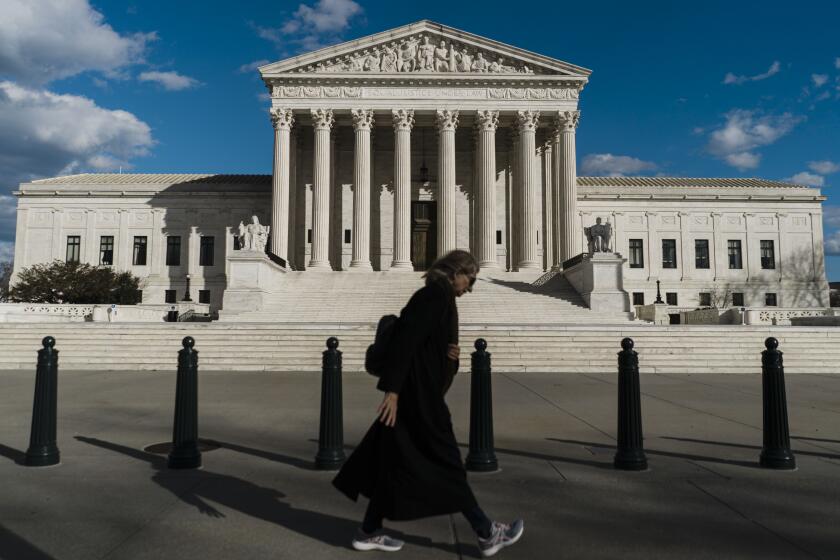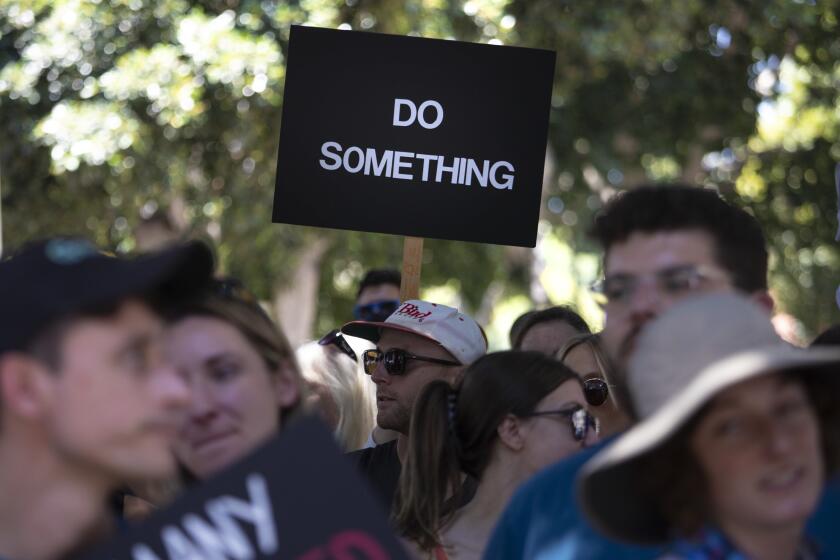Will California gun control legislation survive the Supreme Court ruling? Time will tell

- Share via
SACRAMENTO — Gun control bills have been shooting through the state Legislature at rapid-fire speed, and Gov. Gavin Newsom is eager to sign them. But it’s anyone’s guess how many will survive this Supreme Court.
It’s also not clear which existing California gun controls will remain intact, including biggies such as the ban on sales of military-style assault weapons and high-capacity magazines holding more than 10 rounds.
Many seem in jeopardy because of the conservative court’s ruling that the 2nd Amendment right to bear arms overrides a New York law restricting who may legally carry a concealed gun in public. California and a handful of other states have similar laws.
Writing for the court, Justice Clarence Thomas said the Constitution “protects an individual’s right to carry a handgun for self-defense outside the home.”
And more broadly, Thomas wrote: “To justify a firearm regulation the government must demonstrate that the regulation is consistent with the Nation’s historical tradition of firearm regulation.” Gun lobbies are hailing that statement.
Historical tradition? Meaning, regulations back before there were guns that could fire scores — even hundreds — of bullets per minute? When the population was more rural than urban?
There’s at least one historical precedent for forbidding weapons on the street. Back in 1881, in Tombstone, Ariz., the Earp brothers — Wyatt, Morgan and Virgil — with Doc Holliday enforced an ordinance that banned the packing of sidearms in town. That sensible rule led to the shootout at O.K. Corral.
Would the Tombstone law be held unconstitutional by the current court? Allowing the outlaw gang called the Cowboys to “protect” itself against town marshal Virgil Earp?
Another firearm regulation of more recent history — a half century ago — comes to mind. It arguably was California’s first modern gun control law.
Half a dozen members of the Black Panther Party carrying loaded guns burst through the massive doors of the state Assembly chamber while 20 brothers in arms waited outside in the hall in 1967. I was inside the chamber that day and can testify that virtually everyone was terrified.
High court strikes down gun laws in California, New York and six other states that restrict permits to carry a concealed weapon.
The Panthers were ostensibly protesting a Republican-sponsored bill to ban the carrying of loaded firearms within a city. Actually, it was a publicity stunt that put the Panthers on the map. But it shocked and scared the legislators, who passed a bill making it illegal to carry a loaded gun in public, with some exceptions. Republican Gov. Ronald Reagan quickly signed it.
Would that law be deemed unconstitutional today?
Experts are divided over how much California’s toughest-in-the-nation gun laws will be eroded by the court ruling.
“This will have a broad impact on laws in California particularly,” predicts UCLA law professor Adam Winkler, who specializes in firearms laws. “The court has signaled it is going to be much more skeptical of gun laws.
“Those likely to be vulnerable, are ones most popular with gun safety advocates: bans on assault weapons, bans on high-cap magazines, the raised [gun-buying] age, red flag laws, waiting periods, ammo background checks and some of the remaining concealed-carry permitting requirements.
“The court is likely to strike down bans on high-capacity magazines. You might see the 10-day waiting period go.
“We’re going to see battles for years to come.”
And, he says, “Tombstone’s law would be unconstitutional.”
But Garen Wintemute, who heads the UC Davis Violence Prevention Research Program and has studied shootings for decades, is more optimistic about the survival of California’s tough gun controls.
“I think California and other states will continue their commitment to preventing violence,” he says. “And if the Supreme Court puts up obstacles, they’ll find ways around them.
“I have a lot of respect for the intelligence and ingenuity of California policymakers. This is a setback, but we are good at overcoming them and we will overcome this one.”
He might get an argument over the “intelligence and ingenuity” of politicians — a truly American “historical tradition.”
California leaders vow to craft new gun restrictions hours after a Supreme Court decision threatening limits on carrying handguns in public.
Legislators, working with state Atty. Gen. Rob Bonta and the governor, have created a concealed-carry bill designed to skirt the court ruling.
“Our goal is to be bold but be constitutional — to be as expansive as we can within the framework laid down by the Supreme Court,” says state Sen. Anthony Portantino (D-La Cañada Flintridge), the bill’s author.
The court ruled that it’s OK for states to require permits to carry concealed weapons in public. But the requirements need to be specific and uniform, not arbitrary and subjective as has been the case in New York and California — depending on the whim of a local sheriff.
Gun owners no longer can be required to show “good cause” why they need to carry a weapon in public. But states can restrict guns in “sensitive places,” such as schools, government buildings and polling places.
“We’re going to push the envelope,” Portantino says.
His legislation would require a concealed weapons carrier to be at least 21, require disclosure of all prior arrests, convictions and restraining orders, and mandate in-person interviews, psychiatric evaluations and character references.
Guns would be banned from schools, government buildings, medical facilities, public transportation, public parks, concerts and bars.
“The bill will never become law,” says Sam Paredes, executive director of Gun Owners of California.
But it’s expected to pass the Legislature and be signed by Newsom — along with bills to ban ghost guns, allow shooting victims to sue dealers who peddle illegal guns and forbid manufacturers to market their weapons to minors.
Meanwhile, be prepared for more guns on the street. Let’s hope parking lots don’t become O.K. Corrals.
More to Read
Sign up for Essential California
The most important California stories and recommendations in your inbox every morning.
You may occasionally receive promotional content from the Los Angeles Times.













